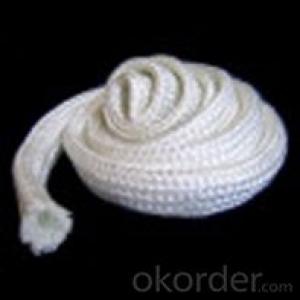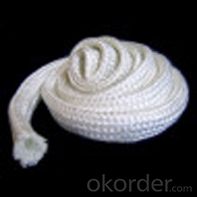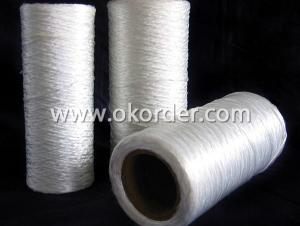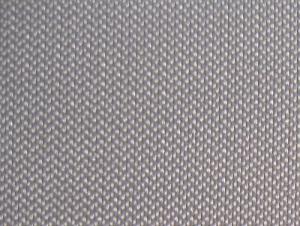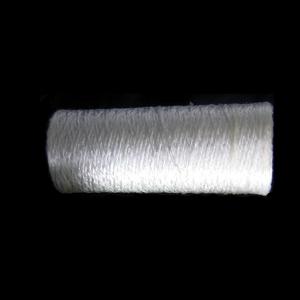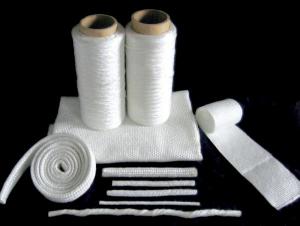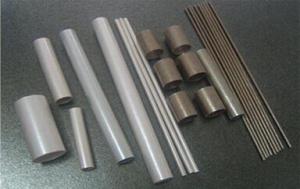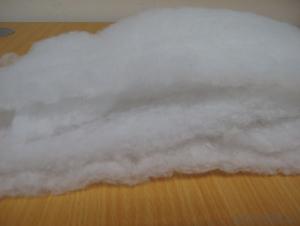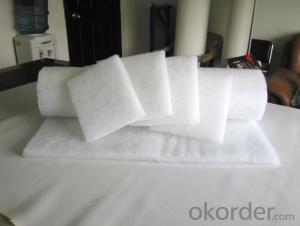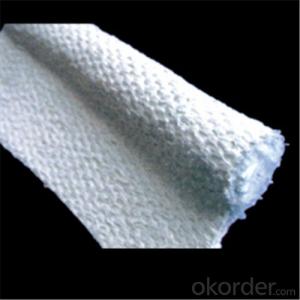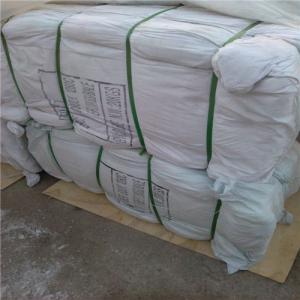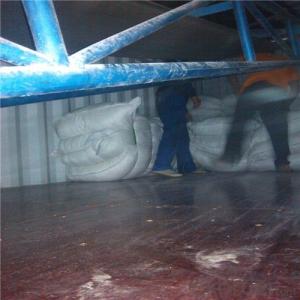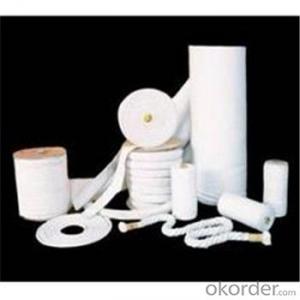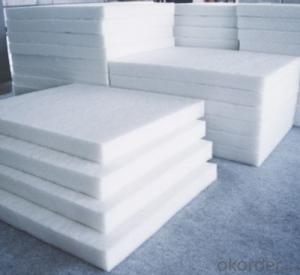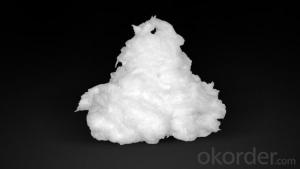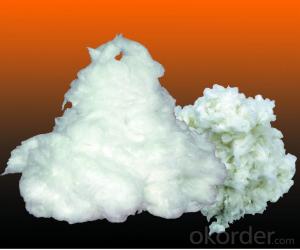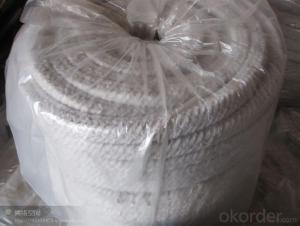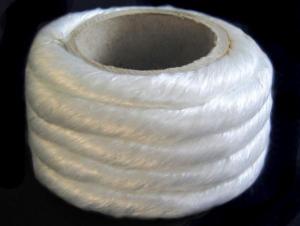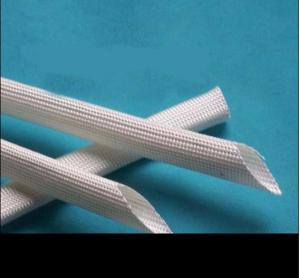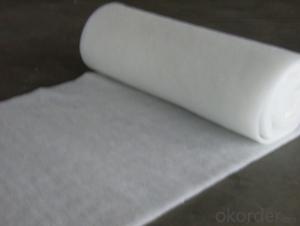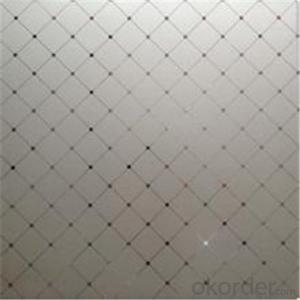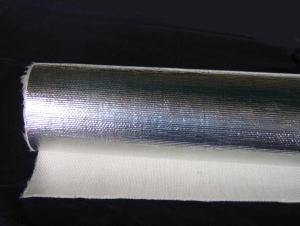High Tensile Insulating Ceramic Fiber Bulk for Industrial Boiler with Glass Fiber Textiles
- Loading Port:
- Shanghai
- Payment Terms:
- TT OR LC
- Min Order Qty:
- 10 m.t.
- Supply Capability:
- 100 m.t./month
OKorder Service Pledge
OKorder Financial Service
You Might Also Like
Quick Details
| Place of Origin: | China (Mainland) | Shape: | Block | Material: | ceramic fiber |
| SiO2 Content (%): | 44-52% | Al2O3 Content (%): | 44-55% | MgO Content (%): | 0 |
| CaO Content (%): | 0 | Refractoriness (Degree): | Common (1580°< Refractoriness< 1770°) | CrO Content (%): | 0 |
| SiC Content (%): | 0 | Model Number: | DKJL | Brand Name: | |
| color: | white | Application:: | textile manufacture | ceramic fiber bulk: | high temperature ceramic fiber for furnace melting |
| fireproof material: | fireproof ceramic fiber bulk for sealing | Shrinkage (1800℉, 3h):: | 3% | Fiber Diameter: | 3-4.5 |
| Density (kg/m³ ):: | 128 | Working Temperature:: | 1200℃ | specification temperature:: | 1260℃ |
| Ultimate Strength (≥ MPa):: | 0.08 |
Packaging & Delivery
| Packaging Detail: | All the fibers are packed in sack with the packing weight(20kg) Or made according to customer's requirement |
| Delivery Detail: | within 20 days or as per your order quantity. |
Specifications
Ceramic Fiber Bulk for melting
1. Low heat storage and thermal conductivity
2. Excellent chemical and thermal stability
Our Services
Product Description
Refractory thermal insulation Ceramic Fiber Bulk
The production of our ceramic fiber spun/blowing bulk takes use of electric resistance furnace melting method with the characteristics of stable performance, long fiber, strong tensile strong, less shot, excellent thermal stability, clean and white color etc. it is the optimum material for the production of fiber textile and also the perfect material for sealing and filling.
Product Characteristics:
1. Low heat storage and thermal conductivity
2. Excellent chemical stability
3. Excellent thermal stability
4. No bond and corrosive material
5. Excellent thermal shock resistance
6. Excellent sound insulation
Item | COM | ST | HP | HA | HZ | |
Specification Tem(°C) | 1100 | 1260 | 1260 | 1360 | 1430 | |
Working Tem(°C) | 1050 | 1100 | 1200 | 1350 | ||
Color | white | white | white | white | white | |
Fiber dia(um) | Blowing | 2-3 | 2-3 | 2-3 | 2-3 | 2-3 |
Swinging | 3-4.5 | 3-4.5 | 3-4.5 | 3-4.0 | 3-4.0 | |
Chemical | Al2O3 | 44 | 46 | 47—49 | 52-55 | 39-40 |
Al2O3+SIO2 | 96 | 97 | 99 | 99 | - | |
Al2O3+SIO2+ZrO2 | - | - | - | - | 99 | |
ZrO2 | - | - | - | - | 15-17 | |
Fe2O3 | 0.2 | 0.2 | 0.2 | |||
Na2O+K2O | ≤0.5 | ≤0.5 | 0.2 | 0.2 | 0.2 | |
All the fibers are packed in sack with the packing weight: 20kg Or made according to customers s requirement. | ||||||
Application:
1. Raw material of fiber textile
2. Filling material of wall lining of industrial furnace
3. Raw material of wet method products
4. Raw material of fiber spraying, casting materials and coating materials
- Q: Can glass fiber textile be used in corrosion-resistant materials?
- Yes, glass fiber textile can be used in corrosion-resistant materials. Glass fiber textiles, also known as fiberglass textiles, are made from woven or knitted strands of glass fibers. These fibers are resistant to corrosion from most chemicals, moisture, and UV radiation. When used as reinforcement in corrosion-resistant materials, such as composites or coatings, glass fiber textiles can enhance the overall corrosion resistance of the material. The high strength-to-weight ratio of glass fibers also makes them a suitable choice for applications where corrosion resistance is required, such as in the construction of chemical storage tanks, pipes, or marine structures. Additionally, glass fiber textiles can be combined with various resin systems to create corrosion-resistant laminates or coatings that provide excellent protection against corrosive environments. Overall, glass fiber textiles offer a viable solution for incorporating corrosion resistance into materials and ensuring their durability in challenging conditions.
- Q: Can glass fiber textiles be used for making reinforcement materials in infrastructure?
- Yes, glass fiber textiles can be used for making reinforcement materials in infrastructure. Glass fiber textiles, also known as fiberglass, have excellent properties that make them ideal for reinforcement purposes. They are lightweight, yet incredibly strong and durable, making them suitable for reinforcing concrete, asphalt, and other construction materials. Glass fiber textiles provide high tensile strength and are resistant to corrosion, making them an ideal alternative to steel reinforcement. They are also non-conductive and non-magnetic, which can be advantageous in certain infrastructure projects. Additionally, glass fiber textiles have good thermal and chemical resistance, making them suitable for use in various environments and climates. Furthermore, glass fiber textiles can be easily molded and shaped to fit specific design requirements, allowing for flexibility in infrastructure projects. They can be used in various forms, such as sheets, mats, or bars, depending on the application and structural needs. The use of glass fiber textiles as reinforcement materials in infrastructure offers several benefits. It reduces the weight of the structure, making it more cost-effective and easier to transport and install. It also enhances the durability and longevity of the infrastructure, as glass fiber textiles are not susceptible to rust or decay, unlike traditional steel reinforcement. Overall, glass fiber textiles are a viable and practical option for making reinforcement materials in infrastructure. They offer numerous advantages and can contribute to the construction of strong, durable, and sustainable infrastructure projects.
- Q: What are the different reinforcement options for glass fiber textile?
- Some common reinforcement options for glass fiber textile include epoxy resin, polyester resin, vinyl ester resin, and thermoplastic matrices like polypropylene and polyethylene. These options provide added strength, durability, and resistance to various environmental factors.
- Q: Can glass fiber textiles be used for automotive interiors?
- Yes, glass fiber textiles can be used for automotive interiors. Glass fiber textiles are known for their high strength and durability, making them suitable for various applications, including automotive interiors. These textiles can be used to create upholstery fabrics, headliners, door panels, and other interior components in vehicles. Glass fiber textiles offer excellent resistance to wear and tear, as well as resistance to heat and chemicals. Additionally, they can be easily molded into different shapes and forms, allowing for customization and design flexibility in automotive interiors. Overall, glass fiber textiles provide a viable option for enhancing the quality and functionality of automotive interiors.
- Q: Can glass fiber textile be used in consumer electronics?
- Consumer electronics can indeed utilize glass fiber textiles. These textiles possess remarkable mechanical properties, are lightweight, and flexible, making them ideal for various applications in consumer electronics. They can be utilized as reinforcement materials in electronic devices like smartphones, tablets, and laptops, enhancing their durability and providing structural integrity. Additionally, owing to their high temperature resistance and electrical insulation properties, glass fiber textiles can serve as substrate materials for flexible electronic components, including flexible printed circuit boards (PCBs). Moreover, these textiles can act as shielding materials to safeguard electronic devices against electromagnetic interference (EMI) and radio frequency interference (RFI). By incorporating glass fiber textiles, consumer electronics can benefit from improved robustness and efficiency, contributing to their overall development.
- Q: Can glass fiber textiles be used in the fashion industry?
- Yes, glass fiber textiles can be used in the fashion industry. Glass fiber textiles offer unique properties such as strength, durability, and heat resistance, making them a suitable material for various fashion applications. They can be used to create innovative and futuristic designs, adding a touch of modernity to fashion collections. Additionally, glass fiber textiles can be combined with other fabrics to enhance their properties, resulting in functional and stylish garments.
- Q: What are the applications of glass fiber textiles?
- Glass fiber textiles have a wide range of applications due to their unique properties. They are widely used in industries such as construction, automotive, aerospace, and electronics. They are commonly used for insulation, reinforcement, and composite materials, as they offer excellent strength, durability, and resistance to heat, chemicals, and corrosion. Additionally, glass fiber textiles can be found in various consumer products like sports equipment, furniture, and clothing for their lightweight and flexible nature.
- Q: How do glass fiber textiles perform in terms of durability?
- Glass fiber textiles are known for their exceptional durability. The use of glass fibers in textile production results in fabrics that are extremely strong and resistant to wear and tear. These textiles can withstand high levels of stress and are less likely to stretch or shrink compared to other types of textiles. Additionally, glass fiber textiles have excellent resistance to chemicals, moisture, and UV radiation, making them highly suitable for outdoor applications and environments with harsh conditions. Furthermore, glass fiber textiles have a long lifespan and maintain their structural integrity over time, ensuring their durability in various applications such as in the automotive, aerospace, and construction industries.
- Q: How do glass fiber textiles affect worker safety?
- Glass fiber textiles can have both positive and negative impacts on worker safety. On the positive side, these textiles are known for their excellent heat resistance properties, making them suitable for use in high-temperature environments. They can effectively protect workers from heat-related risks, such as burns and thermal radiation. Additionally, glass fiber textiles have high tensile strength, which can provide protection against cuts and abrasions, minimizing the risk of injuries. However, there are also potential safety concerns associated with glass fiber textiles. Glass fibers can be sharp and brittle, leading to skin irritation and respiratory issues if they come into contact with the skin or are inhaled. Workers handling glass fiber textiles should therefore be provided with appropriate personal protective equipment (PPE), such as gloves, masks, and safety glasses, to mitigate these risks. Furthermore, the manufacturing process of glass fiber textiles involves the use of chemicals and high temperatures, which can present hazards if not properly controlled. Employers must ensure proper ventilation, training, and monitoring to prevent exposure to harmful substances and minimize the risk of accidents. Overall, glass fiber textiles can enhance worker safety in certain applications, such as high-temperature environments, but they also require careful handling and appropriate safety measures to mitigate potential risks.
- Q: Can glass fiber textiles be used in aircraft interiors?
- Yes, glass fiber textiles can be used in aircraft interiors. They are lightweight, durable, and fire-resistant, making them suitable for various applications such as seat covers, curtains, carpets, and wall panels in aircraft cabins. Additionally, glass fiber textiles offer good acoustic insulation properties, enhancing passenger comfort during flights.
Send your message to us
High Tensile Insulating Ceramic Fiber Bulk for Industrial Boiler with Glass Fiber Textiles
- Loading Port:
- Shanghai
- Payment Terms:
- TT OR LC
- Min Order Qty:
- 10 m.t.
- Supply Capability:
- 100 m.t./month
OKorder Service Pledge
OKorder Financial Service
Similar products
Hot products
Hot Searches
Related keywords
